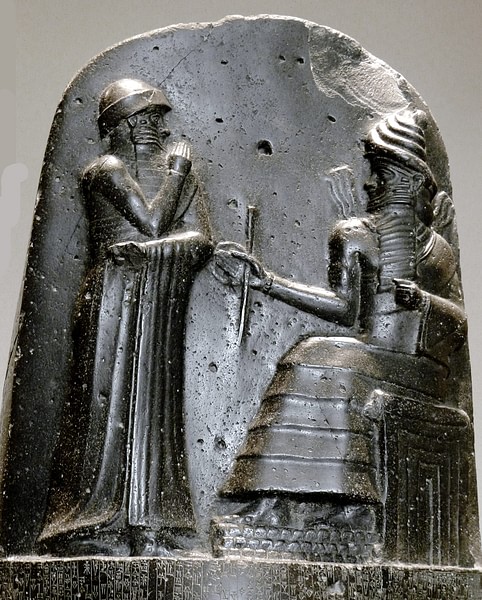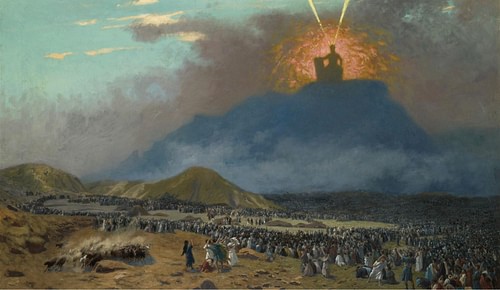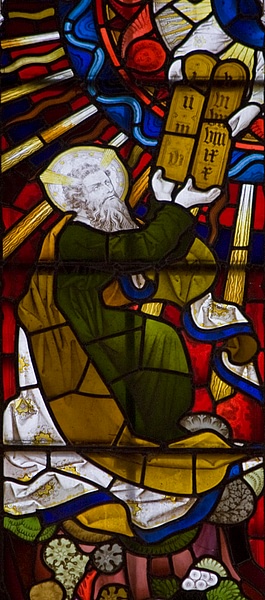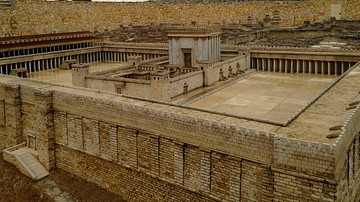
The Ten Commandments introduce the legislation received by Moses on Mt. Sinai after the Israelites escaped from Egypt (as related in the biblical book of Exodus). The "ten commandments" is often used as shorthand for the basic rules that govern the worship of the God of Israel as well as ethical principles that govern human relationships. The commandments remain central to the Abrahamic faiths of western tradition, Judaism, Christianity, and Islam.
What Moses received on Mount Sinai (or Mount Horeb in other texts) was essentially the constitution for the nation of Israel. This included elements that would set them apart from the other nations:
- a distinct form of worship where sacrifices were only to be offered to the God of Israel
- distinct dietary laws (Leviticus 11)
- distinct incest codes (Leviticus 18)
- a distinct physical appearance, that of circumcision
- one day devoted to God, the Sabbath
The Ten Commandments were also extended into the details for establishing the priesthood (under Moses' brother Aaron), the different types of sacrifices, laws for compensation for damages, and the purity/impurity issues for the eventual Temple in Jerusalem. All this material is found in the rest of the biblical books that constitute the Torah, or the teachings of Moses, Leviticus, Numbers, and Deuteronomy. The ten commandments are unique in the claim that they were "written with the finger of God" on two tablets of stone, and then placed in the Ark of the Covenant (Exodus 31:18; Deuteronomy 10:2-5).
By tradition, the Ark of the Covenant became the portable tent shrine throughout the wilderness years and the formation of tribal lands in Canaan. When Solomon built the Temple in Jerusalem, the Ark and its contents were placed in the center, the "holy of holies."
The Ten Commandments
- I am the Lord your God, who brought you out of Egypt, out of the land of slavery. You shall have no other gods before me.
- You shall not make for yourself an image in the form of anything in heaven above or on the earth beneath or in the waters below. You shall not bow down to them or worship them; for I, the Lord your God, am a jealous God, punishing the children for the sin of the parents to the third and fourth generation of those who hate me, but showing love to a thousand generations of those who love me and keep my commandments.
- You shall not misuse the name of the Lord your God, for the Lord will not hold anyone guiltless who misuses his name.
- Remember the Sabbath day by keeping it holy. Six days you shall labor and do all your work, but the seventh day is a sabbath to the Lord your God. On it you shall not do any work, neither you, nor your son or daughter, nor your male or female servant, nor your animals, nor any foreigner residing in your towns. For in six days the Lord made the heavens and the earth, the sea, and all that is in them, but he rested on the seventh day. Therefore, the Lord blessed the Sabbath day and made it holy.
- Honor your father and your mother, so that you may live long in the land the Lord your God is giving you.
- You shall not murder.
- You shall not commit adultery.
- You shall not steal.
- You shall not give false testimony against your neighbor.
- You shall not covet your neighbor’s house. You shall not covet your neighbor’s wife, or his male or female servant, his ox or donkey, or anything that belongs to your neighbor.
(Exodus 20:2-17)
In the Hebrew, the ten are shortened to simple negative commands: "do not murder," "do not commit adultery," etc. In the Greek version of the Hebrew Scriptures (the Septuagint), they are referred to as the Decalogue, or "ten words". In terms of iconography, the ten commandments are portrayed in either Hebrew or the later Roman numerals.
Details of the Ten Commandments
The first commandment - "you shall have no other gods before me" - became the basis for the modern concept of monotheism, the belief in one God. However, there was no such concept in ancient Judaism; the God of Israel both created the gods of the nations and acknowledged their existence. This commandment addresses the issue of worship. "Worship" in the ancient world always referred to sacrifices, not belief. This commandment orders the Israelites only to offer sacrifices to the God of Israel.
The second commandment against "images" reflects a Jewish polemic against the other nations and their plethora of statues which were considered useless in relation to God’s salvation. This command however is problematic. Eyewitness accounts of the Temple in Jerusalem claim that the curtain that divided the holy of holies had images of the twelve symbols of the zodiac. The commandment may reflect that same ban as the first; no sacrifices to images of the other gods.
The abuse of the name of God is more well-known in the King James version, "you shall not take the name of the Lord your God in vain." This does not refer to swearing in the common sense (as in "God damn it!"), but in the ancient practice of swearing oaths in the name of one’s god. Such an oath that called upon the divine as a witness was inviolate.
Keeping the Sabbath by refraining from work reflects the story of creation in Genesis. More details were added to this in the Scriptures, as the original dictate did not define "work." The "seventh day" was the Sabbath for Jews; Christians retained the idea but moved it to Sunday in recognition of the day Jesus rose from the dead.
The sixth commandment - "You shall not murder" - has been the subject of frequent debate among scholars and theologians, as some translations have "You shall not kill." Is the dictate only against the intentional killing of another or does it apply to war? Over the centuries hundreds of wars have been committed in the name of God. Pacifists traditionally cite this commandment in their anti-war views.
The commandment against adultery was crucially important. In a world without DNA tests, paternity had to be assured to keep bloodlines intact. Adultery meant the violation of another man’s property, and both partners were condemned to death.
The commandment against false testimony was important because a false witness could cause to harm to others. It eventually made its way into our system of justice, the reason why witness testimony in law courts was done by swearing on a Bible. That line has now been removed, but when witnesses say, "I swear to tell the truth," everyone knows that they are swearing under the auspices of the commandment.
"Coveting," again, leads to harmful actions against your neighbor and your neighbor’s wife.
The Mosaic Covenant at Mount Sinai
The ten commandments form the basic concept of what became known as the "Mosaic Covenant." A "covenant" simply means a contract, understood as a treaty between a people and their god(s). The covenant with Moses mirrors other ancient treaties, such as the ones among the Hittites and Mesopotamian cultures. The terms of the treaty promise protection from the god(s) if the group honors the deity(ies) with obedience and offerings. The famous Code of Hammurabi and the stela show him receiving the laws and social codes (and applicable punishments) from the sun god Shamash who was also the god of justice (1792-1750 BCE).
Such covenants follow a pattern:
- A story that outlines the historical context that led to a treaty
- Specific details of the ordinances and required rituals
- Reading the text or publicly announcing its details to the group
- A list of blessings for obedience followed by curses or violence when the treaty is broken. In this sense, a 'sin' was defined as a violation of a god’s commandments.
All of these details are found in the books following Exodus. Technically, Moses received 613 commandments in all.
Apodictic & Case Law
In Biblical lists of the commandments, the first ten are set apart from the others. Originally, this was not because they were considered the most important. The ten commandments are distinguished from all the rest, by a term known as "apodictic law". Apodictic laws are considered absolutes. Notice that the first ten are not followed by a form of punishment. There is no punishment listed for what will happen if one of these is broken. In other books of the Bible, there are references to a form of punishment as being cut off from the land of Israel.
Many of these passages concern the eventual settlement in the land of Canaan and admonitions to keep the land sacred. It was implicit in the first ten that these violations would result in God’s expelling the Israelites from the land in the form of exile. Hence, the books of the Prophets explain the disasters of the Assyrian conquest (722 BCE) and the Babylonian conquest (587 BCE) as God’s punishment against the sin of idolatry in the land.
The remaining 603 commandments are known as case law. They are usually introduced with "If it is the case that ... " followed by either an intentional or unintentional violation. They can be fixed or atoned for. Atonement in this sense meant covering it over or undoing any harm. There are specific rituals and sacrifices ordained for each type of violation in case law.
Chronology
Scholars debate the exact chronology of the story of the Ten Commandments. The Jewish Scriptures contain many different sources combined with oral traditions that were often edited over time. The tradition places the story of Exodus c. 1300 BCE, coinciding with the rise of the New Kingdom in Egypt. But there are theories that the codification of the Ten Commandments was only inserted c. 600 BCE when the books of the Bible were most likely first written down. The final editing of the first five books took place during the period of the Babylonian exile (587-539 BCE).
Philo of Alexandria (20 BCE - c. 50 CE) was a Jewish philosopher who wrote several treatises on the meaning of Jewish law for Greek audiences. He explained that the Ten Commandments encompassed all Jewish laws by their implications. For example, adultery was banned because it contributed to indecent behavior. The ban on murder included attitudes and disrespect toward one’s neighbor (Decalogue, 168).
The Ten Commandments in Early Christianity
The fullest explication of the Ten Commandments is found in Matthew’s "Sermon on the Mount" (Matthew 5). In portraying Jesus as the new Moses, Matthew included a major section on Mosaic Law. In this passage, the Law of Moses is not eliminated or superseded by Jesus; Matthew’s Jesus intensifies the commandments:
You have heard that it was said to the people long ago, "You shall not murder, and anyone who murders will be subject to judgment." But I tell you that anyone who is angry with a brother or sister will be subject to judgment. ... You have heard that it was said, "You shall not commit adultery." But I tell you that anyone who looks at a woman lustfully has already committed adultery with her in his heart. (Matthew 5:21-28)
In historical context, Matthew is urging his community to "Be perfect, therefore, as your heavenly Father is perfect." (Matthew 5:48)

As the Christian movement began attracting more Gentiles (non-Jews), Luke in Acts 15 (and Paul in Galatians 2) related a meeting held in Jerusalem on whether the Gentiles should convert to Judaism first. James, the brother of Jesus, made the decision that Gentiles did not have to adopt the ethnic identity markers for Jews (circumcision, dietary laws, and Sabbath observance), but "we should write to them [Gentiles], telling them to abstain from food polluted by idols, from sexual immorality, from the meat of strangled animals and from blood (Acts 15:20).
In all of Paul’s communities, the ban against idolatry was upheld. In Paul's letter to the Romans:
Let no debt remain outstanding, except the continuing debt to love one another, for whoever loves others has fulfilled the law. The commandments, "You shall not commit adultery," "You shall not murder," "You shall not steal," "You shall not covet," and whatever other command there may be, are summed up in this one command: "Love your neighbor as yourself." Love does no harm to a neighbor. Therefore love is the fulfillment of the law. (Romans 13:8-10)
The Noahide Laws
The Ten Commandments were given to the Jewish people. However, in the early formation of what became Rabbinical Judaism (2nd century CE), some of the commandments were designated universal. The biblical basis was derived from the story of Noah in Genesis, with a claim that the covenant with Noah was addressed to all the sons of Noah. This is the list of nations found in Genesis 10.
But you must not eat meat that has its lifeblood still in it. And for your lifeblood I will surely demand an accounting. I will demand an accounting from every animal. And from each human being, too, I will demand an accounting for the life of another human being. (Genesis 9:4-5)
As articulated in the later Babylonian Talmud (Sanhedrin 59a), Gentiles are enjoined:
- To cease idolatry
- Never to curse God
- Not to commit murder
- Not to commit adultery, bestiality, or sexual immorality
- Not to steal
- Not to eat flesh torn from a living animal
- To establish courts of justice
The admonitions are related to the way in which Gentiles could "have a place in the world to come" (Olam ha-ba), God’s institution of the kingdom on earth. In modern parlance, the term "righteous Gentiles" is applied. In contemporary Judaism, the Ten Commandments are recited in synagogues three times a year and are aligned with specific readings of Torah from Exodus and Deuteronomy, depending upon the holiday.
Christianity in the 2nd Century CE
In the 2nd century CE, the Christian leaders no longer had ties to ethnic Judaism but were Gentile converts. However, they retained Jewish tradition in the form of the worship of the God of Israel, and the utilization of the Jewish Scriptures to articulate what became an independent religion.
The non-canonical Letter of Barnabas claimed that Christians now had the only correct interpretation of God’s commandments. Citing Exodus, this text related that when Moses brought down the stone tablet, there originally only had the first ten. Finding the Israelites in idolatry, he smashed them and threw them to the ground, creating an earthquake to swallow the sinners. When he went back to get another set, that was when God added 603 further commandments, as a punishment for Jews. Christianity now taught that Christians only had to obey the first ten, as these were universal for all humankind and reflected the original intention of God (Barnabas, ch. XXXIII).
The Ten Commandments in Islam
When the Prophet Muhammad (570-632) issued the dictates of Islam, the Ten Commandments remained central to the worship of God and community relations. The ban on idolatry was central, while some of the others included some contemporary abuses. For example, the "Do not murder" dictate included "Do not kill your children for fear of poverty" (Quran, Surahs 22-36).










